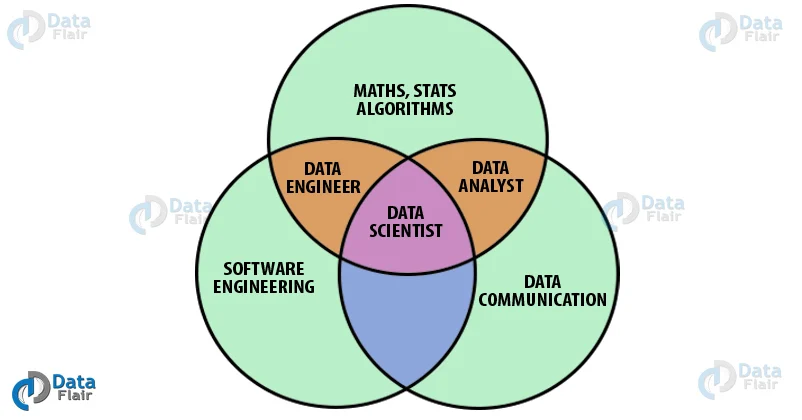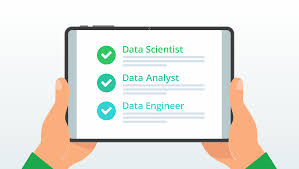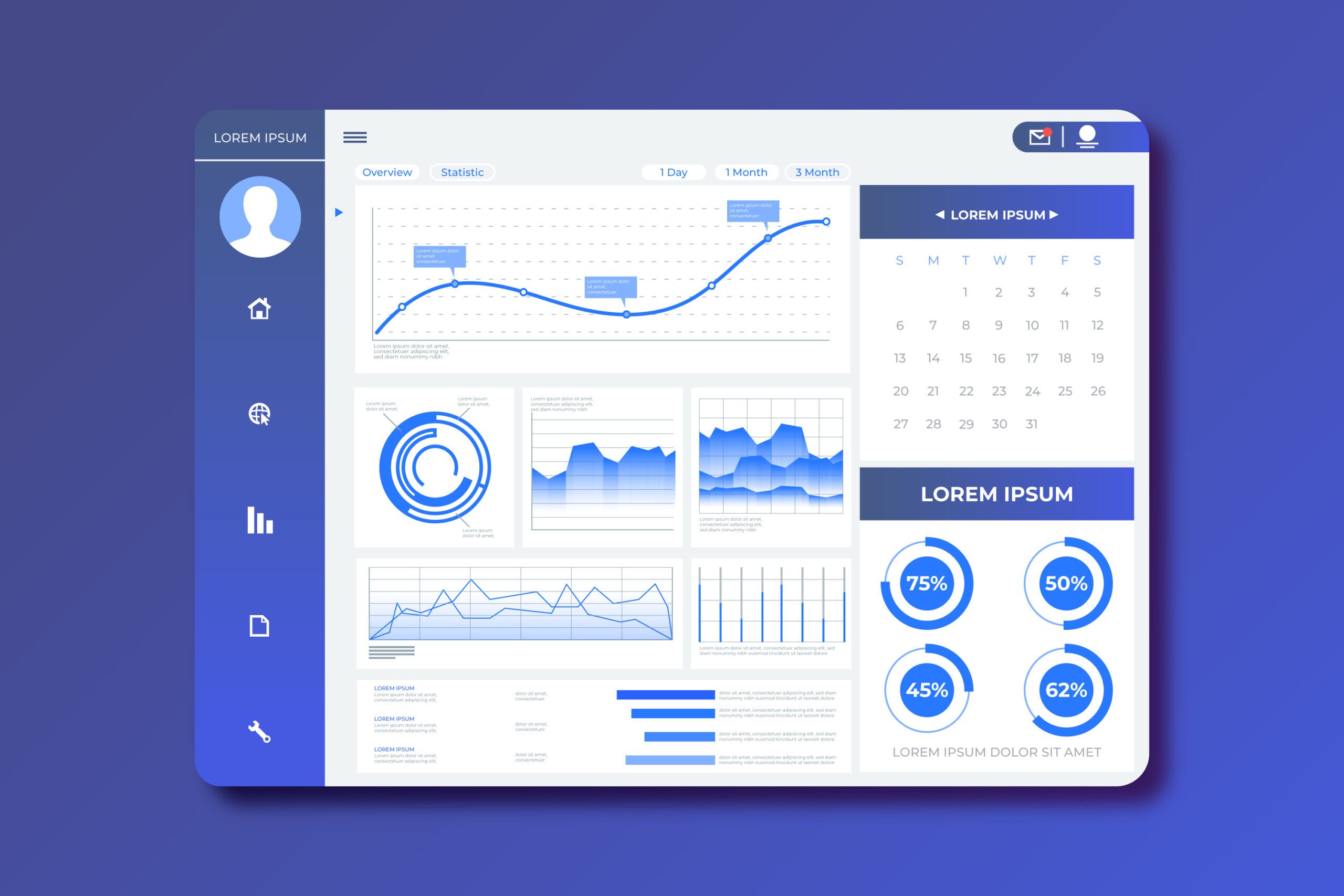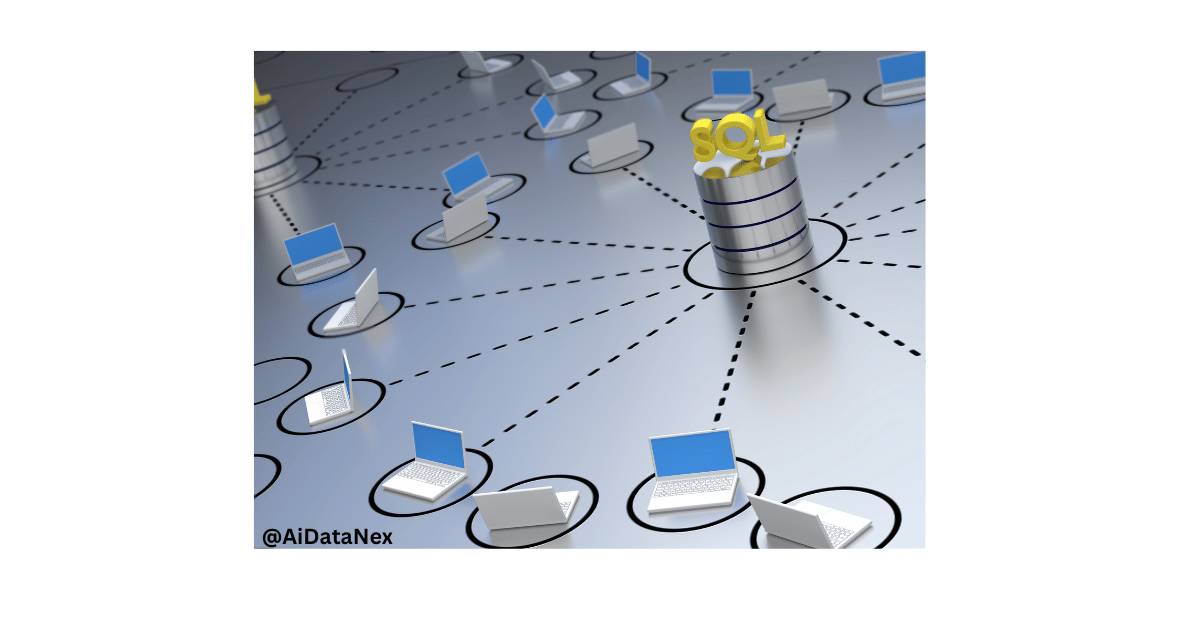Data Science, Data Engineering, and Data Analytics are three distinct but interconnected fields in the realm of data analysis. Data Science involves using statistical and mathematical techniques to extract insights and patterns from large datasets, while Data Engineering focuses on developing and managing the infrastructure and tools required to process and store data.
On the other hand, Data Analytics is concerned with analyzing data to gain valuable insights and make data-driven decisions. Each field requires specific skills and knowledge, but they all contribute to the overall goal of leveraging data for business success.
Understanding the differences and similarities between these fields is crucial for organizations aiming to harness the power of data effectively.

Credit: data-flair.training
1. Introduction: The Data-driven Triad
The Data-Driven Triad examines the distinctions between Data Science, Data Engineering, and Data Analytics. Explore the unique roles and skill sets of each field in this comprehensive analysis.
Data Science Vs Data Engineer Vs. Data Analytics
The world of data is vast and complex. Every day, businesses generate massive amounts of data that need to be analyzed and processed to gain valuable insights. This is where the data-driven triad of Data Science, Data Engineering, and Data Analytics comes in.
In this blog post, we will explore the differences between these three fields and how they work together to provide businesses with the insights they need to succeed.
Data Science
Data Science is a field that focuses on extracting insights from data. It involves a combination of statistical analysis, machine learning, and programming skills to identify patterns and trends in data. Here are some key points about Data Science:
- Data Scientists use statistical analysis to identify patterns and trends in data.
- They use machine learning algorithms to build predictive models that can be used to forecast future trends.
- Data Scientists need strong programming skills to work with large datasets and build complex models.
Data Engineering
Data Engineering is a field that focuses on building and maintaining the infrastructure needed to store and process large amounts of data. It involves designing and building data pipelines that can move data from one system to another. Here are some key points about Data Engineering:
- Data Engineers design and build data pipelines that can move data from one system to another.
- They work with large datasets and need to have a deep understanding of databases and data warehousing.
- Data Engineers need to have strong programming skills and be proficient in languages like SQL and Python.
Data Analytics
Data Analytics is a field that focuses on analyzing data to gain insights into business operations. It involves using statistical analysis and visualization techniques to identify trends and patterns in data. Here are some key points about Data Analytics:
- Data Analysts use statistical analysis and visualization techniques to identify trends and patterns in data.
- They work with data that has already been processed and need to have a deep understanding of statistical methods.
- Data Analysts need to have strong programming skills and be proficient in languages like R and Python.
The data-driven triad of Data Science, Data Engineering, and Data Analytics work together to provide businesses with the insights they need to succeed. Each field has its own unique set of skills and expertise, and businesses need all three to make the most of their data.
By understanding the differences between these fields, businesses can make informed decisions about which areas to invest in and how to best utilize their data.
2. Data Science: Unlocking Insights From Complex Data
Data Science, Data Engineering, and Data Analytics are distinct yet interconnected fields that play crucial roles in unlocking insights from complex data. While Data Science focuses on extracting meaningful patterns and predictions, Data Engineering focuses on data infrastructure and management, and Data Analytics emphasizes interpreting and visualizing data to drive decision-making.
Understanding the differences between these fields is essential for organizations to harness the power of data effectively.
Data Science: Unlocking Insights From Complex Data
Data Science is a branch of computer science that deals with extracting meaningful insights from complex data. It is a multidisciplinary field that involves statistical analysis, machine learning, and data visualization. Data Scientists use various tools and techniques to analyze data and extract valuable insights that can help businesses make data-driven decisions.
Key Skills Required For Data Science
To become a Data Scientist, you need to have a combination of technical and analytical skills. Some of the essential skills required for a Data Scientist are:
- Strong programming skills in languages like Python, R, and SQL
- Good understanding of statistics and mathematics
- Knowledge of machine learning algorithms and techniques
- Ability to work with big data and data visualization tools
- Strong problem-solving and analytical skills
The Role Of A Data Scientist
The role of a Data Scientist is to analyze complex data sets to identify trends and patterns that can help businesses make informed decisions. Some of the key responsibilities of a Data Scientist include:
- Collecting and processing large datasets
- Cleaning and preparing data for analysis
- Applying statistical models to analyze data and extract insights
- Developing machine learning models to predict future trends
- Communicating insights to stakeholders through data visualization
Applications Of Data Science
Data Science has various applications in different industries. Some of the key applications of Data Science are:
- Predictive analytics in finance and insurance
- Recommender systems in e-commerce and social media
- Fraud detection in banking and finance
- Image and speech recognition in healthcare
- Demand forecasting in retail
Data Science is a rapidly growing field that has the potential to revolutionize the way businesses operate. With the increasing amount of data generated every day, the demand for skilled Data Scientists is only going to increase in the future.
– Key Skills And Tools
Data Science, Data Engineering, and Data Analytics are distinct but interconnected fields in the realm of data analysis. Key skills and tools required for these roles include programming languages like Python and R, statistical modeling, machine learning, data visualization, and database management systems such as SQL and Hadoop.
These professionals utilize their expertise to extract insights, build data infrastructure, and solve complex business problems using data-driven approaches.
Key Skills And Tools
Data Science:
- Python: Proficiency in programming language is essential for data scientists, as it is widely used for data analysis and machine learning tasks.
- R: Another popular programming language in the data science field, especially for statistical analysis and data visualization.
- Machine Learning: Strong understanding of machine learning algorithms and techniques to build predictive models and make data-driven decisions.
- Statistics: Knowledge of statistical concepts and techniques to interpret and analyze data accurately.
- Data Visualization: Ability to create visual representations of data using tools like Tableau or matplotlib to effectively communicate findings.
- SQL: Proficiency in SQL is necessary for data extraction, manipulation, and querying from databases.
- Big Data Technologies: Familiarity with distributed computing frameworks like Hadoop or Spark to handle large-scale datasets efficiently.
Data Engineering:
- ETL (Extract, Transform, Load): Proficiency in designing and implementing ETL processes to extract data from various sources, transform it, and load it into data warehouses or data lakes.
- Database Management: Strong knowledge of database systems like SQL Server, Oracle, or MySQL to design and optimize database structures.
- Data Modeling: Ability to design data models and schemas to ensure efficient data storage and retrieval.
- Programming: Proficiency in programming languages like Python or Java for developing data pipelines and automation scripts.
- Cloud Platforms: Familiarity with cloud platforms like AWS or Azure for building scalable and reliable data infrastructure.
- Data Warehousing: Understanding of data warehousing concepts and technologies like Snowflake or Redshift for organizing and managing large volumes of data.
- Data Quality and Governance: Knowledge of data quality assessment techniques and data governance practices to ensure data accuracy and compliance.
Data Analytics:
- Excel: Proficiency in using Excel for data manipulation, analysis, and visualization.
- Statistical Analysis: Understanding of statistical concepts and techniques to perform exploratory data analysis and hypothesis testing.
- Data Visualization: Ability to create visually appealing and informative charts, graphs, and dashboards using tools like Tableau or Power BI.
- SQL: Proficiency in SQL for data querying and extraction from relational databases.
- Business Intelligence Tools: Familiarity with business intelligence tools like QlikView or MicroStrategy for interactive data analysis and reporting.
- Data Interpretation: Strong analytical and problem-solving skills to interpret data and provide actionable insights.
- Domain Knowledge: Understanding of the specific domain or industry for which data analytics is being performed to ensure relevant and meaningful analysis.
Data science requires skills in programming, machine learning, statistics, and data visualization, while data engineering focuses on ETL processes, database management, and data modeling. Data analytics, on the other hand, emphasizes skills in Excel, statistical analysis, data visualization, and business intelligence tools.
Each field requires a unique set of skills and tools to effectively work with data and derive insights.
– Core Responsibilities
Data Science, Data Engineering, and Data Analytics each have distinct core responsibilities. Data Scientists focus on analyzing complex data sets and developing predictive models. Data Engineers are responsible for building and maintaining data infrastructure. Data Analysts gather and interpret data to provide insights for decision-making.
Core Responsibilities
Data Science:
- Utilize statistical and machine learning techniques to analyze complex data sets: This involves extracting, cleaning, and organizing data to identify patterns and trends, which can then be used to make data-driven decisions.
- Develop and implement algorithms: Data scientists create and implement machine learning models to predict future trends and behaviors, and to optimize processes.
- Communicate findings to non-technical stakeholders: Data scientists translate their analyses into actionable insights for business leaders and other non-technical team members.
Data Engineer:
- Design, construct, install, and maintain data systems and pipelines: Data engineers build the infrastructure required for optimal extraction, transformation, and loading of data from a wide variety of sources.
- Ensure data quality and reliability: Data engineers develop processes to cleanse, validate, and monitor data to ensure accuracy and consistency.
- Collaborate with data scientists and analysts: Data engineers work closely with other data professionals to understand their data needs and provide them with the necessary infrastructure and tools.
Data Analytics:
- Collect, process, and analyze data: Data analysts gather and clean data, apply statistical and mathematical models, and use programming languages to analyze complex data sets.
- Generate reports and visualizations: Data analysts create dashboards, reports, and visual representations of data to communicate findings and insights to stakeholders.
- Identify trends and patterns: Data analysts interpret data to identify trends, correlations, and patterns that can be used to inform business decisions.
– Career Path And Opportunities
Explore diverse career paths in data science, data engineering, and data analytics for promising opportunities. Each field offers unique skill sets and growth potential in the ever-evolving tech industry. Aspiring professionals can tailor their career trajectory to match their interests and ambitions.
Career Path And Opportunities
Data Science, Data Engineering, and Data Analytics are three distinct fields within the realm of data. Each offers unique career paths and opportunities for professionals seeking to leverage their skills and expertise. Let’s explore the potential career trajectories and opportunities within these disciplines.
Data Science
- Varied Career Options: Data scientists have diverse career paths, spanning industries such as healthcare, finance, marketing, and technology. They can work as data analysts, machine learning engineers, or research scientists.
- Lucrative Salaries: Data scientists command competitive salaries due to the high demand for their specialized skills and expertise in handling complex data sets.
- Continuous Learning and Growth: In the rapidly evolving field of data science, professionals have the opportunity to engage in continuous learning and skill development, ensuring their knowledge remains current and relevant.
Data Engineering
- In-Demand Skill Set: Data engineers are highly sought after due to their expertise in designing, building, and maintaining scalable data infrastructure. Their skills in data warehousing, ETL processes, and data pipeline development are crucial for organizations.
- Opportunities for Innovation: Data engineers have the chance to contribute to innovative projects, such as developing real-time data processing systems and implementing advanced data storage solutions.
- Career Progression: With experience, data engineers can advance into leadership roles, such as data engineering managers or chief data officers, overseeing strategic data initiatives within organizations.
Data Analytics
- Versatile Career Paths: Data analysts can pursue careers in diverse industries, including finance, e-commerce, and consulting. They often work with stakeholders to derive insights from data and drive strategic decision-making.
- Impactful Role: Data analysts play a vital role in helping organizations harness the power of data to improve operational efficiency, enhance customer experiences, and drive business growth.
- Flexibility and Mobility: Data analysts have the flexibility to work in various settings, including corporate environments, consulting firms, or as independent consultants, offering them diverse career opportunities.
Professionals in the field of data science, data engineering, and data analytics have abundant career paths and opportunities, allowing them to make meaningful contributions and thrive in the dynamic landscape of data-driven industries.
3. Data Engineering: Building The Data Infrastructure
Data engineering involves building the necessary infrastructure for data processing and analysis. It’s a crucial aspect of data science, data analytics, and data engineering, where data is transformed into insights.
Data Engineering: Building The Data Infrastructure
Data engineering involves creating and maintaining the infrastructure that allows for the processing, storage, and retrieval of data. This role is vital in ensuring that data is accessible and usable for various analytical purposes. Below are the key aspects of data engineering:
- Data Pipeline Development: Designing and implementing data pipelines to efficiently move and transform data from various sources to storage and processing systems. This involves ensuring data quality and reliability throughout the process.
- Database Management: Managing and optimizing databases to ensure data is stored and organized effectively for quick and secure access.
- Infrastructure Maintenance: Overseeing the maintenance and scaling of infrastructure, such as servers, storage, and networking, to support the growing data needs of an organization.
- Streamlining Data Flow: Developing processes and systems to streamline the flow of data within an organization, ensuring efficient data integration and accessibility for analysis.
Data engineering focuses on the technical aspects of managing and optimizing data infrastructure, enabling the seamless flow of data for analysis and decision-making.
– Essential Technologies And Frameworks
To excel in Data Science, Data Analytics, and Data Engineering, essential technologies and frameworks must be understood. Data Science focuses on statistical analysis and machine learning, while Data Analytics is more business-oriented. Data Engineering focuses on the infrastructure and architecture of data systems.
Essential Technologies And Frameworks
- Python: Python is a versatile programming language commonly used in data science, data engineering, and data analytics for its simplicity and extensive libraries.
- SQL: Structured Query Language (SQL) is crucial for managing and querying databases efficiently across all three domains.
- Hadoop: Hadoop is a distributed processing framework that plays a vital role in handling big data in data engineering projects.
- TensorFlow: TensorFlow is an open-source machine learning framework developed by Google, widely used in data science for building and training neural networks.
- Apache Spark: Apache Spark is a fast, in-memory data processing engine that is fundamental for performing large-scale data analytics tasks effectively.
- Tableau: Tableau is a powerful data visualization tool that aids in creating interactive and insightful visualizations for data analytics projects.
Key Considerations For Technologies And Frameworks
- Compatibility: Ensure that the chosen technologies and frameworks are compatible with the specific requirements of the project.
- Scalability: Opt for technologies that can scale efficiently to handle increasing volumes of data as needed.
- Learning Curve: Consider the learning curve associated with each technology and framework to ensure the team can effectively utilize them.
- Community Support: Choose technologies with strong community support to access resources, forums, and updates for seamless implementation.
– Primary Duties
Data Science, Data Engineering, and Data Analytics are distinct roles in the field of data, each with its own primary duties. Data Scientists focus on extracting insights from data, Data Engineers build and maintain data infrastructure, while Data Analysts interpret data to inform decision-making.
These roles play crucial parts in harnessing the power of data in various industries.
Primary Duties
- Data Scientist:
- Develop machine learning models to extract insights from data.
- Interpret and communicate findings to non-technical stakeholders.
- Collaborate with business teams to identify data-driven opportunities.
- Clean and preprocess data for analysis.
- Data Engineer:
- Design and maintain scalable data pipelines.
- Optimize data infrastructure for efficient storage and retrieval.
- Implement data security and compliance measures.
- Collaborate with data scientists to ensure data accessibility.
- Data Analyst:
- Analyze data to identify trends and patterns.
- Create visualizations to communicate data insights.
- Generate reports and dashboards for decision-making.
- Collaborate with stakeholders to understand data requirements.
– Career Trajectory And Demand
Data Science, Data Engineering, and Data Analytics are all high-demand career paths in the tech industry. Each role offers a unique career trajectory with increasing demand for skilled professionals. Data scientists focus on analyzing complex data sets, while data engineers build and manage data infrastructure, and data analysts interpret data to drive business decisions.
Career Trajectory And Demand
- Data Science:
- Data scientists typically start as data analysts or junior data scientists before progressing to senior data scientist roles.
- As they gain more experience, data scientists may advance to positions like data science manager or chief data officer.
- Data Engineer:
- Data engineers often begin in entry-level data engineering roles, working on data pipelines and infrastructure.
- With time, data engineers can move up to senior data engineer or data engineering manager positions.
- Data Analytics:
- Data analysts usually start as junior analysts, focusing on data visualization and basic analysis.
- Progressing in their careers, data analysts may become senior analysts or analytics managers.
Each of these roles is in high demand, with companies across various industries seeking professionals with expertise in data science, data engineering, and data analytics. Organizations rely on these specialists to derive insights from data, build data infrastructure, and inform strategic decision-making processes.
The demand for skilled professionals in these fields is projected to continue growing as businesses increasingly prioritize data-driven approaches to remain competitive in the digital age.
4. Data Analytics: Transforming Data Into Business Intelligence
Explore the distinction between data science, data engineering, and data analytics in the context of transforming data into valuable business insights. Understanding the role of each discipline is crucial for leveraging the power of data in today’s competitive business landscape.
Data Analytics: Transforming Data Into Business Intelligence
Data analytics plays a crucial role in extracting valuable insights from vast amounts of data, enabling organizations to make informed decisions and gain a competitive edge in the market. Here’s how data analytics transforms raw data into actionable business intelligence:
- Data Processing:
- Data analytics involves processing and cleaning raw data to ensure accuracy and consistency.
- Data Visualization:
- Visual representations such as charts, graphs, and dashboards are created to convey complex data patterns in a user-friendly format.
- Statistical Analysis:
- Statistical techniques are applied to identify trends, correlations, and outliers within the data, providing valuable insights for decision-making.
- Predictive Modeling:
- By leveraging machine learning algorithms, data analytics can predict future trends and outcomes based on historical data patterns.
Data analytics empowers organizations to optimize operations, enhance customer experiences, and drive innovation through data-driven strategies.
– Fundamental Techniques And Software
Discover the fundamental techniques and software used in data science, data engineering, and data analytics. Understand the distinctions between these fields and the tools they utilize for processing and analyzing data, enabling you to make informed decisions in your career path within the data industry.
Fundamental Techniques And Software
Data Science, Data Engineering, and Data Analytics are all integral parts of the data landscape, each involving different fundamental techniques and software. Let’s delve into the specifics of each role:
Data Science
- Machine Learning Algorithms: Data scientists utilize a variety of machine learning algorithms such as linear regression, decision trees, and neural networks to build predictive models and make data-driven decisions.
- Programming Languages: Proficiency in programming languages like Python, R, and SQL is essential for data manipulation, visualization, and statistical analysis.
- Big Data Tools: Data scientists often work with big data tools and frameworks such as Hadoop, Spark, and Hive to handle and process large volumes of data efficiently.
Data Engineering
- Data Infrastructure: Data engineers focus on designing, constructing, and maintaining data architecture, including databases, data pipelines, and ETL processes to ensure seamless data flow.
- Database Management Systems: Expertise in database management systems like MySQL, PostgreSQL, and MongoDB is crucial for data storage, retrieval, and optimization.
- Data Warehousing: Data engineers work with data warehousing solutions such as Snowflake, Redshift, and BigQuery to facilitate the storage and analysis of structured data.
Data Analytics
- Statistical Analysis: Data analysts apply statistical techniques to interpret data, identify trends, and uncover insights that drive business decision-making.
- Data Visualization Tools: Proficiency in data visualization tools like Tableau, Power BI, and Google Data Studio enables data analysts to present findings in a visually compelling manner.
- Business Intelligence Platforms: Data analysts utilize business intelligence platforms such as Looker, Domo, and QlikView to generate reports, dashboards, and interactive visualizations for stakeholders.
By understanding the fundamental techniques and software associated with each role, individuals can gain insight into the distinct skill sets and responsibilities within the realm of data.
– Main Tasks And Focus Areas
Data Science involves analyzing complex data sets to extract valuable insights. Data Engineering focuses on designing and maintaining data architecture. Data Analytics focuses on interpreting data to guide business decisions. Each role plays a crucial part in leveraging data for organizational success.
Main Tasks And Focus Areas
Data Science, Data Engineering, and Data Analytics are all integral components of the data ecosystem, each with distinct tasks and focus areas.
Data Science
- Utilizes statistical methods and machine learning algorithms to analyze and interpret complex data sets: Data scientists draw meaningful insights from data, enabling businesses to make informed decisions.
- Involves the development of predictive models and algorithms to forecast trends and patterns within the data: This aids in identifying potential opportunities and risks, allowing companies to strategize effectively.
Data Engineering
- Primarily focused on the design, construction, and maintenance of data pipelines and infrastructure: Data engineers ensure that data is accessible, reliable, and optimized for analytical processes.
- Involves the integration of various data sources and systems to facilitate seamless data flow: This is crucial for enabling real-time analytics and ensuring the efficient storage and retrieval of data.
Data Analytics
- Involves the exploration, cleansing, and visualization of data to extract meaningful insights: Data analysts use statistical techniques and tools to identify trends, patterns, and correlations within the data.
- Focuses on translating complex data into actionable information for decision-making: This empowers organizations to optimize processes, enhance performance, and gain a competitive edge.
While Data Science focuses on extracting insights and building models, Data Engineering is centered on data infrastructure and flow, and Data Analytics revolves around interpreting and visualizing data for decision-making. Each discipline plays a crucial role in harnessing the power of data to drive business success.
– Career Growth And Industry Applications
Explore diverse opportunities in the realm of data with distinct roles – Data Science, Data Engineer, and Data Analytics. Uncover the pathway to career advancement and practical applications across industries within the data science landscape.
Career Growth And Industry Applications
Data Science, Data Engineering, and Data Analytics are all lucrative career paths with unique opportunities for growth and diverse industry applications. Let’s explore each of these fields to understand their career prospects and the industries they impact.
Data Science
- High demand for data scientists across various industries:
- Data scientists are sought after in industries such as healthcare, finance, e-commerce, and technology due to their expertise in extracting insights from complex data sets.
- Promising career growth opportunities:
- Data scientists can advance to senior and leadership positions, such as Chief Data Officer or Data Science Manager, with the potential to influence strategic business decisions.
Data Engineering
- Vital role in building and maintaining data infrastructure:
- Data engineers play a critical role in designing and implementing scalable data pipelines and architecture, contributing to the seamless flow of data within organizations.
- Diverse industry applications:
- Data engineering is essential in industries like telecommunications, energy, and manufacturing, where large volumes of data need to be processed and stored efficiently.
Data Analytics
- Wide-ranging industry applications:
- Data analysts are indispensable across industries such as marketing, retail, and education, where their insights drive decision-making processes and optimize business performance.
- Growth opportunities in specialized domains:
- Data analysts can specialize in areas like business intelligence, marketing analytics, or healthcare analytics, opening doors to exciting career trajectories.
Each of these data-focused roles offers unique career paths and industry applications, catering to the growing demand for professionals who can harness the power of data to drive business success.
5. Overlaps And Distinctions: Where The Roles Intersect And Diverge
Exploring the overlaps and distinctions between Data Science, Data Engineering, and Data Analytics reveals where these roles intersect and diverge. Understanding the unique contributions of each field is crucial for businesses seeking to leverage data effectively. Clarifying these roles can optimize team dynamics and enhance overall data strategy.
Overlaps And Distinctions: Where The Roles Intersect And Diverge
Data Science, Data Engineering, and Data Analytics are three distinct yet interconnected roles within the field of data analysis. While they share certain similarities, each role has its own focus and responsibilities. Understanding where these roles overlap and diverge is crucial for anyone considering a career in data-related fields.
Let’s explore the overlaps and distinctions between Data Science, Data Engineering, and Data Analytics.
Overlaps:
- Strong Foundation in Data: All three roles require a solid understanding of data and its management. Whether it’s collecting, cleaning, or transforming data, data proficiency is a common requirement.
- Programming Skills: Data Science, Data Engineering, and Data Analytics professionals need to be proficient in programming languages such as Python, R, or SQL. These skills are vital for data manipulation and analysis.
- Data Visualization: Effective data visualization is crucial in all three roles. Professionals must be able to present complex data in a visually appealing and understandable manner.
Distinctions:
**Data Science:**
- Focus: Data Science focuses on extracting insights and making predictions from data through statistical analysis and machine learning techniques.
- Skills: Data Scientists need strong mathematical and statistical skills, along with expertise in machine learning algorithms and programming languages.
- Responsibilities: They develop and implement predictive models, perform exploratory data analysis, and communicate insights to stakeholders.
**Data Engineering:**
- Focus: Data Engineering focuses on the development and maintenance of data infrastructure and systems to ensure data availability and reliability.
- Skills: Data Engineers require expertise in database systems, data warehousing, ETL (Extract, Transform, Load) processes, and programming languages.
- Responsibilities: They design and build data pipelines, manage data storage, and optimize data retrieval for efficient analysis.
**Data Analytics:**
- Focus: Data Analytics concentrates on analyzing and interpreting data to uncover patterns, trends, and insights that drive decision-making.
- Skills: Data Analysts need strong analytical skills, proficiency in data manipulation, and knowledge of statistical analysis techniques.
- Responsibilities: They perform data exploration, create reports and dashboards, and provide actionable insights to stakeholders.
Understanding the overlaps and distinctions between Data Science, Data Engineering, and Data Analytics is crucial for organizations to leverage the full potential of their data. While these roles may have different focuses and responsibilities, collaboration among professionals in these fields is essential for successful data-driven decision-making.
6. Choosing Your Path: Which Data Career Suits You?
Explore the differences between data science, data engineering, and data analytics to determine the best fit for your career path. Understanding the unique roles and skill sets required in each field will help you make an informed decision based on your interests and strengths.
Data Science Vs Data Engineer Vs. Data Analytics
If you’re considering a career in data, it’s important to understand the differences between data science, data engineering, and data analytics. Each field has its unique set of skills, responsibilities, and career paths. In this section, we will discuss how to choose the right data career for you.
1. Data Science
Data science involves using statistical and computational methods to extract insights from data. It focuses on developing predictive models, identifying patterns, and making data-driven decisions. If you enjoy solving complex problems, have strong analytical skills, and are proficient in programming languages such as R or Python, a career in data science may be a good fit for you.
Some of the key responsibilities of a data scientist include:
- Collecting and cleaning data
- Creating predictive models
- Conducting statistical analysis
- Communicating insights to stakeholders
2. Data Engineering
Data engineering involves designing and maintaining the infrastructure that enables data analysis. It focuses on building data pipelines, data warehousing, and data integration. If you have a strong background in computer science, enjoy working with large datasets, and are proficient in programming languages such as SQL or Java, a career in data engineering may be a good fit for you.
Some of the key responsibilities of a data engineer include:
- Developing data pipelines
- Designing and maintaining databases
- Ensuring data quality and reliability
- Building scalable and efficient data systems
3. Data Analytics
Data analytics involves using data to answer specific business questions. It focuses on analyzing data to uncover insights that can inform business decisions. If you have strong problem-solving skills, enjoy working with data, and are proficient in tools such as Excel or Tableau, a career in data analytics may be a good fit for you.
Some of the key responsibilities of a data analyst include:
- Collecting and cleaning data
- Conducting exploratory data analysis
- Creating visualizations and dashboards
- Communicating insights to stakeholders
Choosing Your Path: Which Data Career Suits You?
When choosing a data career path, it’s important to consider your skills, interests, and career goals. Here are some questions to ask yourself:
- What are my strengths and weaknesses?
- What kind of problems do I enjoy solving?
- Which programming languages and tools am I proficient in?
- Do I prefer working with structured or unstructured data?
- What kind of industry or company do I want to work in?
By answering these questions, you can get a better understanding of which data career path may be the best fit for you. Remember, there is no one-size-fits-all approach to a career in data. Choose the path that aligns with your strengths, interests, and career goals.
7. The Future Landscape: Evolving Trends In Data Professions
Explore the evolving trends in data professions, specifically the distinctions between data science, data engineering, and data analytics. Gain insights into the future landscape of these fields and understand the unique roles and responsibilities they entail. Stay ahead of the curve and understand the differences between these crucial data professions.
Data Science Vs Data Engineer Vs. Data Analytics
As technology advances, the field of data professions continues to evolve, resulting in new trends and emerging roles. In this section, we will explore the future landscape of data professions and the evolving trends that are shaping the industry.
The Rise Of Data Science
Data science is a rapidly growing field, and it is expected to continue to expand as more companies seek to utilize data to drive business decisions. Some of the trends that we can expect to see in the future of data science include:
- Increased demand for data scientists with specialized skills such as machine learning, artificial intelligence, and deep learning.
- The rise of automated machine learning platforms, which will make it easier for non-experts to develop machine learning models.
- The use of augmented analytics, which combines human expertise with machine learning algorithms to improve decision-making.
The Future Of Data Engineering
Data engineering is a critical component of any data-driven organization, and it is also evolving rapidly. Here are some of the trends that we can expect to see in the future of data engineering:
- The use of cloud-based data warehousing and processing, which will allow organizations to scale their data infrastructure as needed.
- The adoption of real-time data processing technologies such as Apache Kafka, which will enable organizations to process and analyze data in real-time.
- The rise of data mesh architecture, which emphasizes decentralized data ownership and management.
The Future Of Data Analytics
Data analytics is the process of analyzing data to extract insights and inform decision-making. As the volume of data continues to grow, the field of data analytics is also evolving. Here are some of the trends that we can expect to see in the future of data analytics:
- The use of augmented analytics, which will automate the process of data analysis and reduce the need for human intervention.
- The increasing importance of data governance and data quality, which will ensure that data is accurate and reliable.
- The rise of citizen data scientists, who are non-experts with the ability to use data analytics tools to perform basic analysis.
The future of data professions is exciting, and we can expect to see continued growth and evolution in the years to come. As technology advances, it is essential that organizations stay up-to-date with the latest trends and tools to remain competitive in the data-driven landscape.
8. Conclusion: Navigating The Data Driven Wolrd
Exploring the world of data-driven professions reveals the distinct roles of Data Science, Data Engineering, and Data Analytics. Each field offers unique expertise in handling and interpreting data, contributing to the advancement of technology and business strategies. Understanding the differences and applications of these roles is crucial in navigating the data-driven world.
Navigating The Data-driven World
Data science, data engineering, and data analytics play pivotal roles in today’s data-driven landscape. Understanding the nuances of each field is essential for organizations to leverage data effectively. Let’s explore how these disciplines intersect and differ, guiding you through the data-driven world.
Data Science: Unveiling Insights
- Data science involves extracting insights from complex and diverse data sets:
- Utilizes advanced statistical and machine learning techniques.
- Focuses on predictive modeling, pattern recognition, and data visualization.
- Empowers organizations to make data-driven decisions and gain a competitive edge.
Data Engineering: Building Strong Foundations
- Data engineering focuses on designing and constructing robust data pipelines:
- Involves managing large volumes of data efficiently and ensuring data quality.
- Implements data infrastructure, storage solutions, and ETL processes.
- Enables seamless data flow and accessibility for analytics and decision-making.
Data Analytics: Driving Actionable Insights
- Data analytics revolves around interpreting data to derive actionable insights:
- Emphasizes analyzing historical data to uncover trends and patterns.
- Involves creating reports, dashboards, and data visualizations for stakeholders.
- Facilitates informed decision-making and strategic planning based on data-driven insights.
Navigating the data-driven world requires a comprehensive understanding of data science, data engineering, and data analytics. By harnessing the power of these disciplines effectively, organizations can unlock the full potential of their data assets and drive innovation in today’s dynamic business environment.

Credit: www.kdnuggets.com
Frequently Asked Questions
Which Is Better Data Science Or Data Analytics Or Data Engineering?
Data science involves analyzing complex data sets to uncover insights and make decisions. Data analytics focuses on interpreting data to solve business problems. Data engineering involves creating and managing data infrastructure. Each field has its own unique value and is better suited for different career paths.
Is It Better To Do Data Analytics Or Data Science?
Data analytics and data science are both valuable fields, but they have different focuses. Data analytics involves analyzing and interpreting data to make informed business decisions. Data science, on the other hand, involves developing algorithms and models to extract insights from data.
The choice depends on your specific career goals and interests.
Is It Better To Be A Data Analyst Or Data Engineer?
Both roles have their own importance in the data industry. Data analysts focus on data analysis, visualization, and making decisions based on insights. Data engineers, on the other hand, work on building and maintaining data infrastructure. It depends on your interest and career goals.
Who Gets Paid More Data Scientist Or Data Engineer?
Data scientists generally get paid more than data engineers due to their higher-level skills and expertise in statistical analysis and machine learning. However, the pay gap may vary depending on the company, location, and industry.
Conclusion
The fields of data science, data engineering, and data analytics each play a crucial role in the world of data. While data scientists focus on extracting insights and patterns, data engineers build and maintain the infrastructure, and data analysts interpret and communicate the findings.
Understanding the distinctions between these roles is essential for organizations to effectively leverage the power of data and make informed decisions. So, whether you’re looking to pursue a career in one of these fields or simply seeking to enhance your data literacy, it’s important to recognize the unique contributions and skill sets required for each role.







